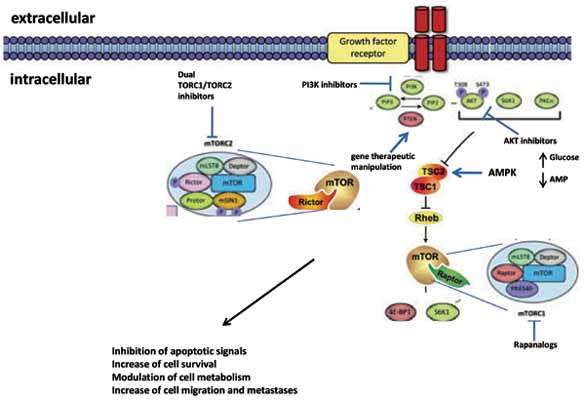Targeting the PI3K/AKT/mTOR pathway in prostate cancer development and progression

Targeting the PI3K/AKT/mTOR Pathway in Prostate Cancer Development and Progression: Insight to Therapy, by Dr Claudio Festuccia (University of L'Aquila, Italy) and published in Clinical Cancer Drugs, volume 3, issue 1 - discusses experimental and clinical data on the pharmacological inhibition of the Akt/mTOR pathways.
These pathways play a key role in the modulation of cellular proliferation, tumor growth and survival through phosphorylation of different downstream molecules. Prostate tumor growth and progression is negatively regulated by Phosphatase and tensin homolog (PTEN) which is genetically and/or functionally silenced in this neoplasia. The aim of the presentation was to analyze the synthesis and functional characterization of different compounds inhibiting phospatidylinositol-4,5-bisphosphate-3-kinase (PI3K), Akt and mTOR activities as well as the feasibility of these inhibitors functioning alone or in combination with standard therapies in aggressive castration resistant prostate cancers (CRPC), a disease stage characterized from high percentage of patients with bone metastases.
Conventional treatment for this disease stage requires, indeed, a multidisciplinary approach (medical therapy, surgery, and radiation), but is primarily palliative. Pharmacological resistance is commonly observed. Activation of PI3K/Akt/mTOR pathways plays a significant role in therapy. The blockade of this pathway may be necessary to increase standard therapies.
"Several preclinical data support the rationale to advance the use of pharmacological inhibitors of PI3k/Akt/mTOR into clinical trials in CRPC as performed for several other solid tumors" remarked Dr. Festuccia.
More information: Festuccia Claudio, Targeting the PI3K/AKT/mTOR Pathway in Prostate Cancer Development and Progression: Insight to Therapy, Clinical Cancer Drugs (2016). DOI: 10.2174/2212697X0301160328201324













